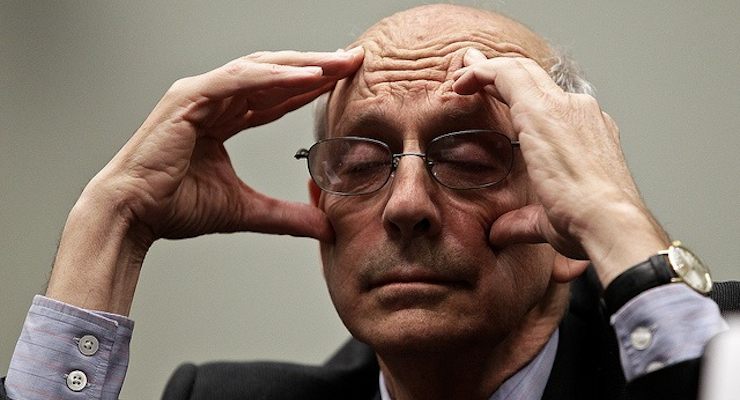

Justice Stephen Breyer testified at a House hearing. (Photo/Steven Masker)
Liberal Supreme Court Justice Stephen Breyer apparently finds no problem with relying upon the rulings of other nation’s judges when deciding cases. In the latest issue of Time, which highlights his new book, Justice Breyer admits that he sees nothing wrong with American courts–including the Supreme Court–relying upon the laws and judicial rulings of other nations.
Should the Supreme Court care that other countries have abolished the death penalty?
That looming question animates Justice Stephen Breyer’s “The Court and the World,” a brisk but academic book that argues that it is relevant for the nation’s top judges to consider what other countries’ legal systems have decided when faced with difficult issues.
“If someone with a job roughly like my own, facing a legal problem roughly like the one confronting me, interpreting a document that resembles the one I look to, has written a legal opinion about a similar matter, why not read what that judge has said?” writes Breyer, who was appointed by President Clinton in 1994. “I might learn from it, whether or not I end up agreeing with it.”
This revelation, for obvious reasons, is highly problematic. Justice Breyer authored a separate dissenting opinion in addition to the minority opinion written by Justice Sonia Sotomayor in the latest death penalty case handed down by SCOTUS at the end of June. In the 5-4 decision on a case out of Oklahoma, which decided whether the sedative midazolam could be used in executions without violating the Eighth Amendment prohibition on cruel and unusual punishment, the majority opinion authored by Justice Samuel Alito upheld the use of lethal injection drugs.
Alito said death penalty opponents are waging a “guerrilla war” against executions–specifically by working to limit the supply of more effective drugs–because they cannot challenge the constitutionality of the death penalty, itself. Justice Breyer’s dissent, which was joined by Justice Ruth Bader Ginsburg, marked the first time two justices declared–let alone in a dissent–that it was “highly likely” to be unconstitutional. It did not sit well with either Justice Antonin Scalia or Justice Clarence Thomas, who pointed out the obvious and underscored why Breyer’s deference to the law and judicial precedent of other nations is a dereliction of his duty as a Supreme Court justice.
“Welcome to Groundhog Day. The scene is familiar: Petitioners, sentenced to die for the crimes they committed (including, in the case of one petitioner since put to death, raping and murdering an 11–month-old baby), come before this Court asking us to nullify their sentences as ‘cruel and unusual’ under the Eighth Amendment,” Justice Scalia joined by Justice Thomas wrote. “They rely on this provision because it is the only provision they can rely on.”
Why is it the “only provision they can rely on,” that is, if they aren’t relying on the laws of other countries? Justices Scalia explains, right after taking a shot at the liberal minority opinion.
“The response is also familiar: A vocal minority of the Court, waving over their heads a ream of the most recent abolitionist studies (a superabundant genre) as though they have discovered the lost folios of Shakespeare, insist that now, at long last, the death penalty must be abolished for good. Mind you, not once in the history of the American Republic has this Court ever suggested the death penalty is categorically impermissible. The reason is obvious: It is impossible to hold unconstitutional that which the Constitution explicitly contemplates. The Fifth Amendment provides that ‘[n]o person shall be held to answer for a capital . . . crime, unless on a presentment or indictment of a Grand Jury,’ and that no person shall be ‘deprived of life . . . without due process of law.’”
In other words, the death penalty cannot be considered unconstitutional by any stretch of Breyer’s, Sotomayor’s or any other liberal imagination because the Constitution explicitly states under what circumstances IT IS permissible. Thus, unless you are looking at the laws of other nations, you cannot possibly fulfill your oath to interpret and uphold the Constitution if you rule otherwise.







